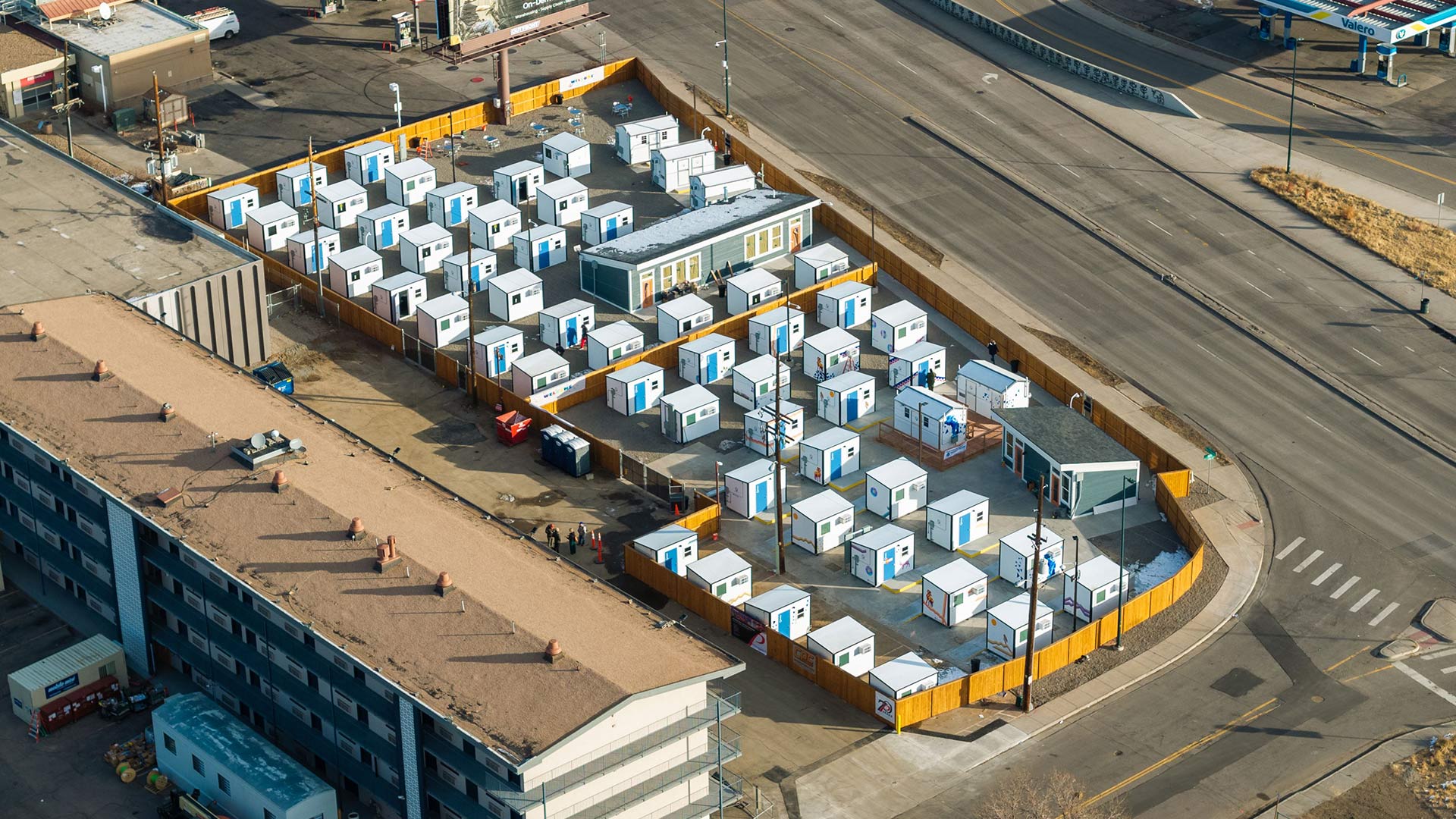 A complex of Pallet homes in Denver gives an example of what The Homing Project hopes to do in Tucson.
A complex of Pallet homes in Denver gives an example of what The Homing Project hopes to do in Tucson.
The Buzz for May 17, 2024

This episode is the second of three that are a part of AZPM's reporting series Where to Live?
There's a spot in midtown Tucson's Keeling neighborhood that could be home to a first-of-its-kind homeless shelter by the end of 2024.
The site, which is comprised of two vacant lots, is owned by the Southern Arizona Land Trust, but they are leasing it to another non-profit, The Homing Project..
"There will be these houses that are essentially freestanding bedrooms," said Kris Olson-Garewal, The Homing Project's co-founder. "They're only 64 square feet, but they have air conditioning, heating, and one thing that intrigues everyone who looks at them who's unhoused a lock on the door and a place to store their things."
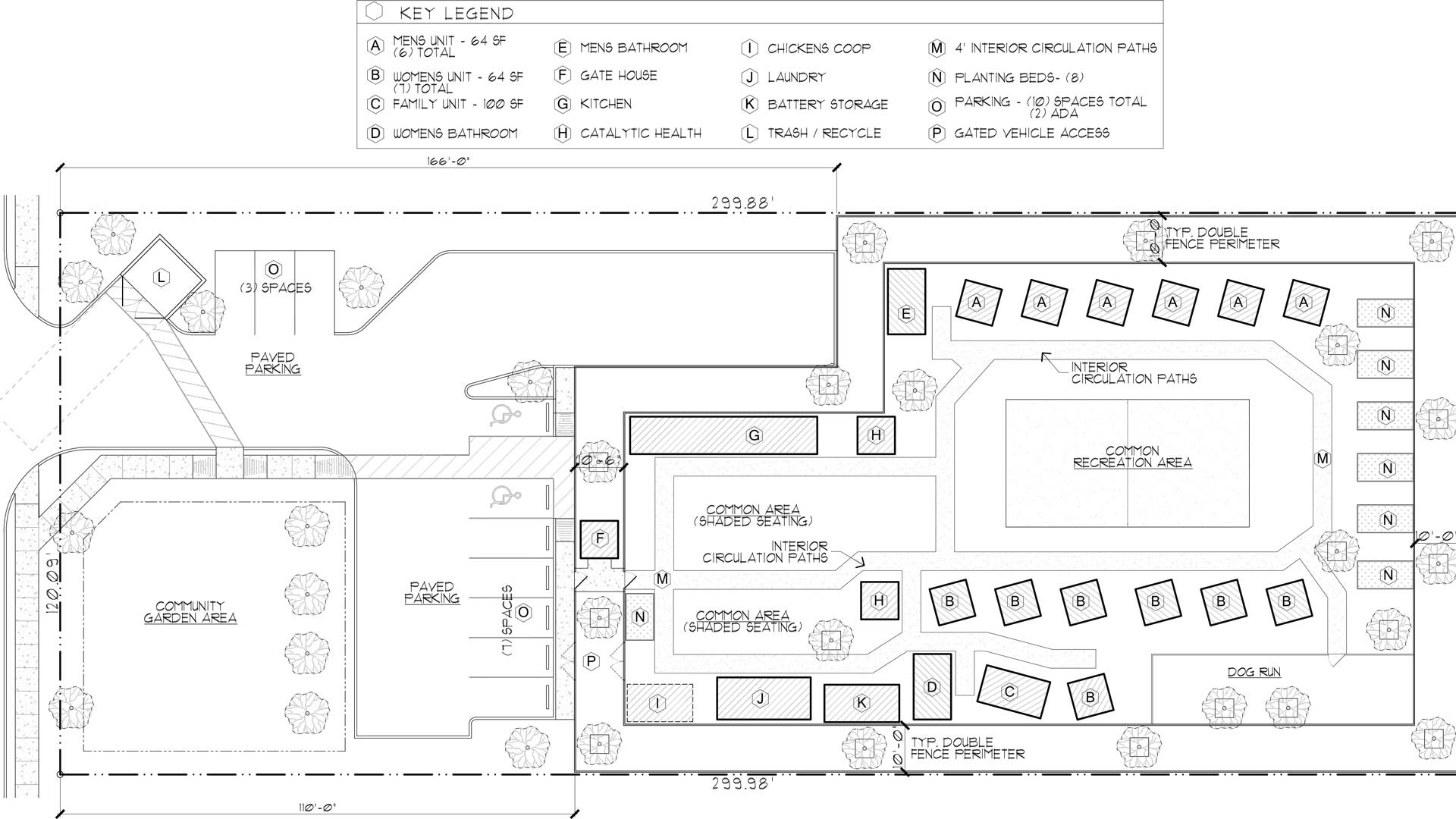 The layout of the homing project in Tucson.
The layout of the homing project in Tucson.
The site will act as a pilot for the group, with ten of the small, modular houses, bathrooms, a kitchen and dining area, laundry facilities, and communal features like a garden, hen houses, and a volleyball court.
"This particular land was donated to us by David and Gypsy Lyle, who does a lot of good work in Tucson, and they wanted us to build an apartment complex here," said Greg Sasse, Executive Director of the Southern Arizona Land Trust. "And then we went through the bidding process. And we found that it was just too expensive for us to develop this property into a 12-unit apartment complex, based on the construction costs and the rate of return," he said.
The Homing Project will get some of that work done while also ensuring the land has some use while the trust waits.
"I called Greg, and he said, 'That's not what we do.' But he did look at our project. And he said, 'It's not what we do, but it's consistent with what we do.' So he took it to his board, and they agreed to what for us is a long-term lease," said Olson-Garewal.
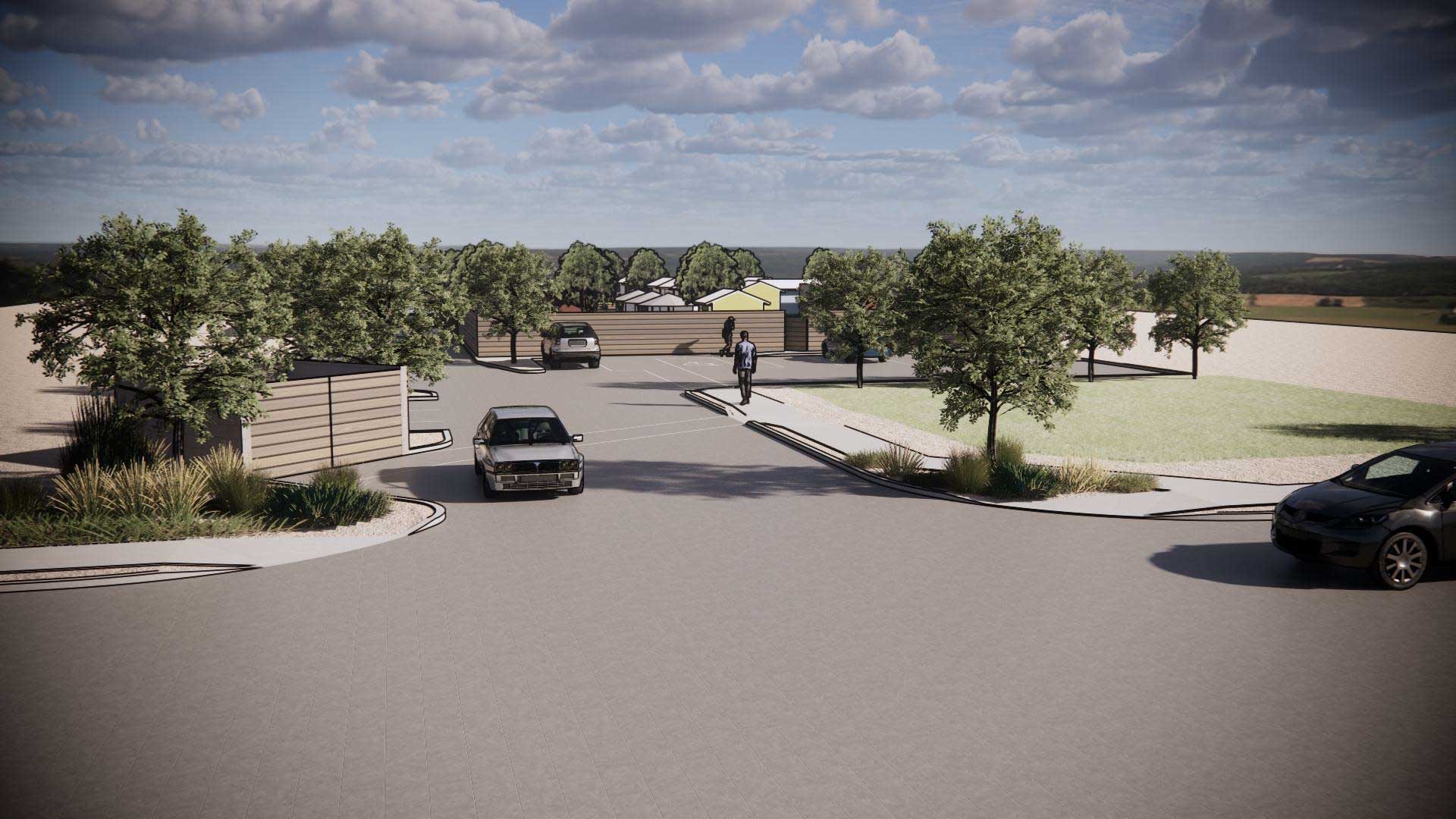 What planners want The Homing Project in Tucson to look like.
What planners want The Homing Project in Tucson to look like.
The nature of the project means the effort is fairly minimal for site planners.
"We met with Greg [Sasse] and found out what his plan is, which is an apartment project with parking and those amenities which also showed extension of the sewer and the water and electric. And so we had a basic site plan to work with. And basically, we've overlaid this Homing Project layout over Greg's site plan I fit it in," said Corey Thompson of Rick Engineering.
"The only design probably that I will have to be involved in of a building will be maybe the laundry facility because it'll just be a sheltered area for the washing machines," said Architect Greg Fahr of Fahr Associates. "And we'll have a clothesline and the other part of the design is simply site planning. Where did these units go. How, what's the clearances between them and the perimeter fencing."
But projects like this often involve buy-in from neighbors and government officials. That is something that this project has had plenty of.
"The city is in a long process of changing some of the codes that we have that make it harder to build sort of different kinds of housing that're outside of the normal single-family home," said CJ Boyd, a council aide to Tucson Vice Mayor Kevin Dahl. "Some of that takes time. It means public input. And we don't want to rush that. But in the meantime, we also are excited when folks are bringing new ideas and say, Well, okay, can we make this work, you know, as a temporary thing? And so Kris had already reached out to me and I told her that if you find anything in Ward Three, Vice Mayor Kevin Dahl has been extremely supportive in having me on the staff as a housing advocate."
Boyd is a Keeling resident, and he said the neighbors have been largely supportive of the Homing Project site.
"Folks understand that this isn't just a problem somewhere else. It's a problem right here. And the whole idea of providing services in the place where people need the services is that you are helping. That you actually increase, you're improving the neighborhood. And there's a sort of this myth that if you build some services, or if you provide some services, that everyone's going to come from all over town, they're gonna be busting them out from California or something like, that's just not the reality."
Olson-Garewal intends for this site to be temporary, and she has a bigger goal in her sites already.
"Eventually, when the lease is up here, we'll be moving to another site, that's about 4.3 acres. And when we go to that site, we'll be gradually putting in 100," she said.
As for this site, Thompson estimates that it will be in city review for about four months, and Olson-Garewal hopes to have construction done within four months once permits are approved.
While the Homing Project is a site that hopes to get people off the streets in by the end of the year, another project in downtown Tucson has already spent a handful of years giving seniors an affordable place to live. And some of them are in a building with historic significance.
The Marist College building was originally built as a Catholic schoolhouse shortly after Arizona became a state. It served that purpose until the 1960s when the local Catholic Diocese began using it.
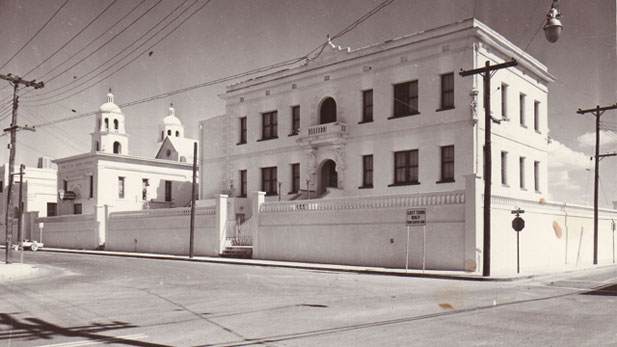 Kimberly Craft and guest discuss the historic Marist College.
Kimberly Craft and guest discuss the historic Marist College.It gradually fell into disrepair, until it and another building to its north came into the hands of the Phoenix-area non-profit The Foundation for Senior Living.
"Marist College itself is right on the cusp of the Tucson Convention Center. So in terms of promoting downtown, it kind of is a nexus if you were to go down Church Street and go buy a dilapidated building, you know, it doesn't show very well. And so folks were very interested," said Steve Hastings, FSL's Chief of Real Estate Services.
FSL tore down the building to the north to make way for a 78-unit midrise apartment building that houses seniors and people who are deaf or blind, but it kept the three-story historic building and renovated it into a smaller eight-unit apartment building with a community center in its basement.
"In terms of construction. I mean, it was in bad shape, we had to rebuild the adobe, we had to put in this interior steel structure because the adobe was overstressed," said Savannah McDonald, an architect and principal with Poster Mirto McDonald. "So we actually built a new structure on the inside, we call it an endoskeleton, dropped in these columns and beams, you see, and basically held the building up with the new structure and then just tied in the adobe. And then we just, you know, reconfigure the interior to fit out a community space here, down here in the basement, and then eight units and the two levels above."
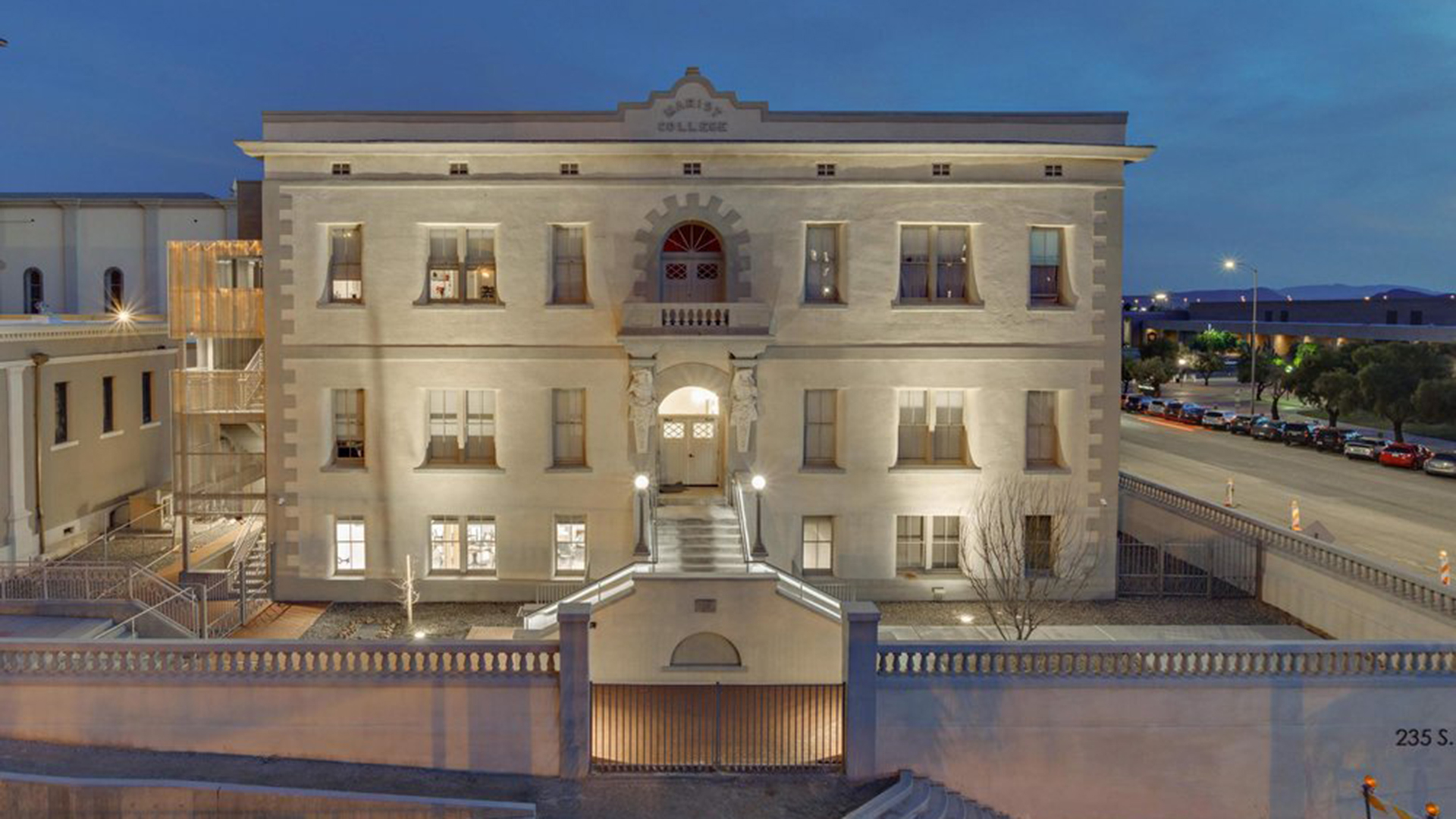
"It was a vacant building. We did tear down the building at the corner of Church and Broadway. It was diocesan offices before they moved over to the new campus. But previous to that it was just an attorney's office, it was functionally obsolescent. We couldn't convert it into anything valuable. So we did tear it down," said Hastings. "If we go into any market and look for an acquisition rehab, if it's full of tenants, really, there's no place to put them right now. So we're almost prevented, you know, unless we want to put them in a hotel for a year and a half. So all of all the stuff we're looking at now, everything in our pipeline is vacant land."
McDonald said that this is not the only instance of PMM rehabbing an older building into housing. They have done it before with affordable senior living at the Bowman Hotel in Nogales and with market-rate housing at the old Benedictine Monastery in midtown Tucson. They are currently working on a project to renovate the old Bisbee High School.
McDonald said that she thinks Tucson will have more such projects in the future, particularly as it figures out what to do with office space that is increasingly not in demand.
"We're actually with the contractor who did this project. When we met with them on a site that's looking to convert a few office buildings into affordable housing. So the case that I'm thinking of is pretty well-suited. The exiting worked pretty well. It was nice, you know, durable construction. So I think so. Certainly."



By submitting your comments, you hereby give AZPM the right to post your comments and potentially use them in any other form of media operated by this institution.